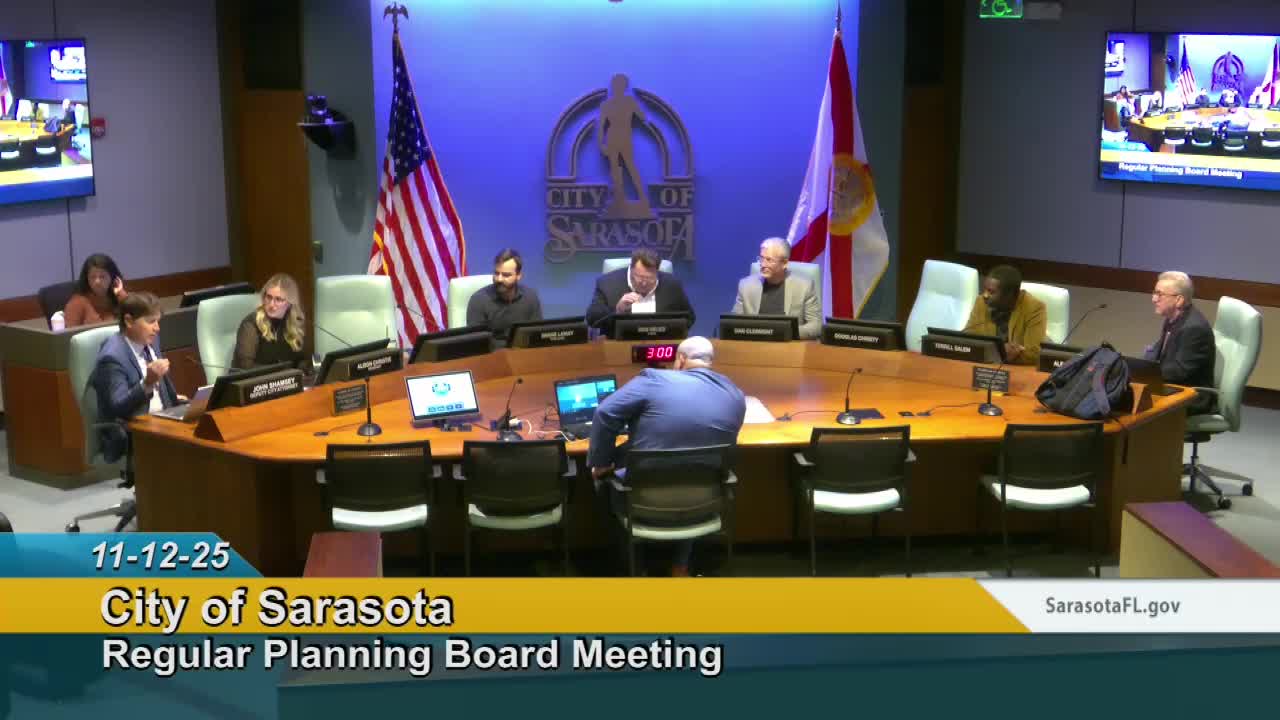Sarasota planning board receives training on ethics, Sunshine Law and quasi-judicial rules
Get AI-powered insights, summaries, and transcripts
Subscribe
Summary
Consulting attorney Randy Mora gave a two-hour training to the City of Sarasota Planning Board on how members should conduct themselves under Florida law, emphasizing ethics, open-meeting rules and the difference between legislative and quasi-judicial proceedings.
Consulting attorney Randy Mora gave a two-hour training to the City of Sarasota Planning Board on how members should conduct themselves under Florida law, emphasizing ethics, open-meeting rules and the difference between legislative and quasi-judicial proceedings.
Mora opened by framing public office as a "public trust," said local officials must avoid substantial conflicts under Chapter 112 of the Florida Statutes, and described the planning boardas a five-member advisory body with three-year terms that the city commission appoints. "When you're doing that, you're not just doing it for number one," Mora said, adding that board members must subordinate personal interests to the public trust.
The presentation then turned to the Sunshine Law and public meetings. Mora cited Article I, Section 24 of the Florida Constitution and Chapter 286 of the Florida Statutes as the foundation for open meetings and said the basic statutory requirements are reasonable notice, an accessible meeting location and minutes that capture the essential business. He warned members that indirect deliberationsincluding text messages, Facebook comments or other online exchangescan create the appearance of unlawful private decision-making.
Mora spent substantial time explaining the legal standards applied to quasi-judicial hearings, where the board applies established law to facts and evidence rather than exercising broad policy discretion. He summarized the three elements appellate courts review after a quasi-judicial decision: whether the record contains "competent substantial evidence," whether procedural due process (notice and an opportunity to be heard) was provided, and whether the board followed the essential requirements of law.
Using examples, Mora distinguished opinion from evidence: anecdotal statements such as "this will destroy property values" are ordinarily opinions, while appraisals, traffic studies or stormwater analyses can be competent substantial evidence. He told members they may accept or discount testimony but should make clear on the record which evidence they relied upon when issuing findings of fact. "If you are receiving facts that meet the standard for competent substantial evidence, you can and should consider that," he said.
Board members asked specific procedural questions during the session: whether evidence introduced at different times (in the packet, during the applicant presentation or on rebuttal) is admissible; how to treat members who present themselves as experts; and when personal familiarity with applicants requires recusal. Mora said evidence presented during the hearing process is generally timely, recommended local rules (for example, asking experts to submit CVs), and explained that a legal conflict of interest requires a tangible pecuniary effect under Chapter 112. He cautioned that discomfort or social ties alone typically do not qualify as a legal conflict in the statutory sense but may warrant abstention if a member cannot impartially adjudicate a quasi-judicial matter.
The attorney also reviewed parliamentary procedure and meeting management: the city charter and local code govern board procedure, Robert's Rules is a last-resort reference, and the presiding officer should control the floor, stick to the agenda and enforce time, place and manner rules for public comment. Mora urged the chair to be a teacher and to preserve decorum so the minority is heard and the majority can act.
The training closed with a short discussion of scheduling (the November meeting next year falls on Veterans Day and some members asked staff to review alternatives). No formal motions or votes were taken during the session. The chair adjourned the meeting after staff agreed to circulate corrected dates for next year's calendar.
The planning board is scheduled to consider agenda items at future meetings; members asked staff to share the draft meeting calendar so they can confirm availability.
